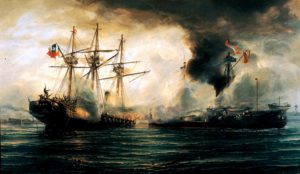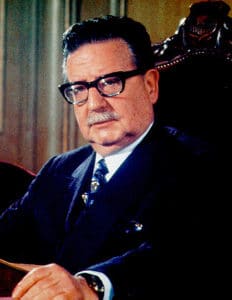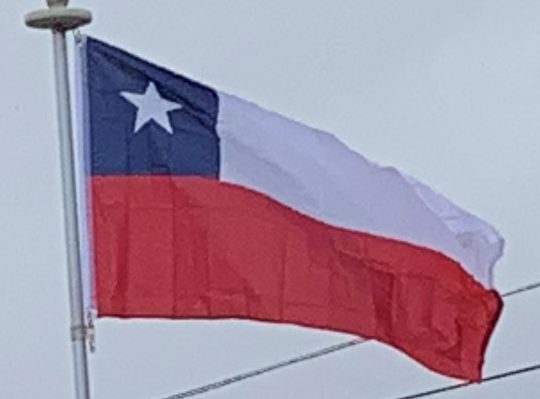
The 1891 Chilean Civil War brought about a redistribution of power between the President and Congress, and Chile established a parliamentary style democracy. However, the Civil War had also been a contest between those who favored the development of local industries and powerful Chilean banking interests, particularly the House of Edwards who had strong ties to foreign investors. Soon after, the country engaged in a vastly expensive naval arms race with Argentina that nearly led to war.
20th Century:
The Chilean economy partially degenerated into a system protecting the interests of a ruling oligarchy. By the 1920s, the emerging middle and working classes were powerful enough to elect a reformist president, Arturo Alessandri, whose program was frustrated by a conservative congress. In the 1920s, Marxist groups with strong popular support arose.
A military coup led by General Luis Altamirano in 1924 set off a period of political instability that lasted until 1932. Of the ten governments that held power in that period, the longest lasting was that of General Carlos Ibáñez del Campo, who briefly held power in 1925 and then again between 1927 and 1931 in what was a de facto dictatorship.
By relinquishing power to a democratically elected successor, Ibáñez del Campo retained the respect of a large enough segment of the population to remain a viable politician for more than thirty years, in spite of the vague and shifting nature of his ideology. When constitutional rule was restored in 1932, a strong middle-class party, the Radicals, emerged. It became the key force in coalition governments for the next 20 years. During the period of Radical Party dominance (1932–52), the state increased its role in the economy. In 1952, voters returned Ibáñez del Campo to office for another six years. Jorge Alessandri succeeded Ibáñez del Campo in 1958, bringing Chilean conservatism back into power democratically for another term.
The 1964 presidential election of Christian Democrat Eduardo Frei Montalva by an absolute majority initiated a period of major reform. Under the slogan “Revolution in Liberty”, the Frei administration embarked on far-reaching social and economic programs, particularly in education, housing, and agrarian reform, including rural unionization of agricultural workers. By 1967, however, Frei encountered increasing opposition from leftists, who charged that his reforms were inadequate, and from conservatives, who found them excessive. At the end of his term, Frei had not fully achieved his party’s ambitious goals.
Salvador Allende:
In the 1970 election, Senator Salvador Allende of the Socialist Party of Chile (then part of the “Popular Unity” coalition which included the Communists, Radicals, Social-Democrats, dissident Christian Democrats, the Popular Unitary Action Movement, and the Independent Popular Action), achieved a partial majority in a plurality of votes in a three-way contest, followed by candidates Radomiro Tomic for the Christian Democrat Party and Jorge Alessandri for the Conservative Party. Allende was not elected with an absolute majority, receiving fewer than 35 percent of votes.

The Chilean Congress conducted a runoff vote between the leading candidates, Allende and former president Jorge Alessandri, and, keeping with tradition, chose Allende by a vote of 153 to 35. Frei refused to form an alliance with Alessandri to oppose Allende, on the grounds that the Christian Democrats were a workers’ party and could not make common cause with the right wing.
